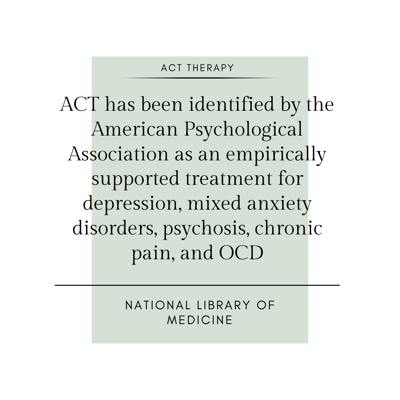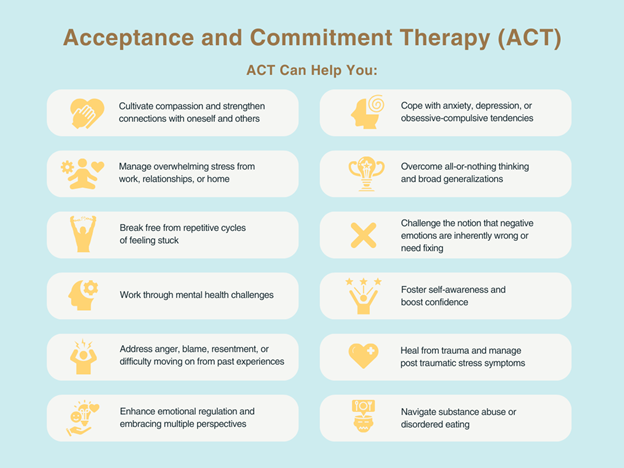Acceptance & Commitment Therapy
Build flexibility and resilience in the face of stress with ACT Therapy

Many of us feel stuck and unhappy. Whether it be major life decisions, body image, relationship problems, family conflict, career stress, financial worries, (you name it!), there are many reasons why we can feel trapped. If left untreated, these feelings can lead to bouts of depression, anxiety, and other stress related conditions.
If you are seeking a way to overcome persistent struggles or feelings of being stuck, Acceptance and Commitment Therapy (ACT) can help. Acceptance and Commitment Therapy can guide you in navigating challenging emotions by fostering acceptance, practicing mindfulness, and identifying core values, which can lead to positive transformations in difficult situations.

What is Acceptance and Commitment Therapy?

Acceptance and Commitment Therapy (ACT) is part of the newer wave of behavioral therapies. It builds on some of the ideas of earlier therapeutic modalities like CBT, while also incorporating mindfulness techniques.
Developed in the late 20th century by psychologist Steven C. Hayes, ACT is designed to help individuals improve their psychological flexibility – the ability to be open, adapt, and effectively pursue one's values, even in the presence of difficult thoughts and emotions.
The key components of ACT include:

Acceptance
Acknowledging and making room for uncomfortable or distressing thoughts and feelings without attempting to change or suppress them.

Cognitive Diffusion
Learning to observe thoughts without being dominated or overwhelmed by them. This helps individuals see thoughts as what they are—just words or images—rather than as literal truths.

Mindfulness
Cultivating a present-moment, non-judgmental awareness of thoughts and emotions. Mindfulness in ACT involves being fully engaged in the present without being entangled by past or future concerns.

Values Clarification
Identifying and clarifying one's core values – the things that truly matter to an individual. These values serve as a compass for making choices and guiding behaviour.

Committed Action
Taking intentional steps toward living a life in accordance with one's values. This involves setting and working towards meaningful goals, even in the face of discomfort or adversity.

Self as Context
Recognizing oneself as the unchanging observer of experiences, thoughts, and emotions, fostering a sense of perspective and detachment from fleeting inner experiences.
ACT is particularly effective for a wide range of mental health issues, including anxiety, depression, eating disorders, OCD, substance use, chronic pain, and stress-related conditions. It doesn't aim to eliminate negative thoughts and emotions but instead helps individuals build a healthier relationship with them, fostering resilience and promoting well-being. The ultimate goal of ACT is to empower individuals to lead richer, more fulfilling lives by embracing their values and committing to actions aligned with those values.
Lets us Help you Find the Right Match
Why Might ACT Therapy Work for Me?
Acceptance and Commitment Therapy (ACT) is a holistic and versatile approach to mental well-being, focusing on enhancing psychological flexibility rather than solely reducing symptoms. Distressing thoughts and emotions, natural to the human experience, are addressed through building skills for a meaningful life. The incorporation of mindfulness techniques promotes non-judgmental awareness, fostering detachment from automatic reactions. ACT's values-centric emphasis aids individuals in aligning actions with personal values, providing purpose and fulfillment. This approach enhances adaptability in a fast-paced world, fostering resilience against various mental health issues.

Globally, depression and anxiety affect millions, with over 300 million living with anxiety disorders and 280 million with depression as of 2019 (World Health Organization). Remarkably, amid these staggering numbers, statistics show that around 75% of individuals benefit from therapy, underscoring the potential impact of therapeutic interventions (American Psychological Association).
This positive correlation between therapy and well-being positions ACT as an evidence-based approach, highlighting its effectiveness in diverse populations and offering a credible and reassuring option for those seeking mental health support.
Support Starts Here
Discover the power of Acceptance and Commitment Therapy (ACT) and improve psychological distress, embrace mindfulness, and live a life aligned by your values. For more information about our approach or to schedule an appointment, please contact us today
How Does Acceptance and Commitment Therapy Work?
Acceptance and Commitment Therapy (ACT) offers a transformative path towards improved mental health by harnessing the power of therapeutic interventions. In the therapeutic space, individuals engaging in ACT can explore and understand the nuances of acceptance, learning to embrace their thoughts and emotions without judgment.
Through targeted therapeutic discussions and skill building, individuals gain insights into the nature of their internal experiences, cultivating a sense of mindfulness that serves as a foundation for change. The therapist acts as a guide, helping individuals navigate the challenging terrain of their thoughts and emotions, facilitating a shift towards greater self-awareness and acceptance.
As previously mentioned, therapy in the context of ACT also focuses on cognitive defusion, a process that helps individuals detach from the often-overpowering influence of their thoughts. By learning techniques to view thoughts more objectively, individuals can break free from the grip of unhelpful thinking patterns, promoting mental flexibility.
The therapist collaborates with the individual, offering practical strategies and exercises to promote cognitive defusion, empowering clients to relate to their thoughts in a healthier, more constructive manner. This newfound perspective serves as a powerful tool for breaking free from the cycle of distress and fostering resilience.

ACT Therapy can empower individuals to embrace acceptance, navigate challenges, and align their actions with values for a life of resilience and fulfillment.
Furthermore, therapy in the context of ACT guides individuals in clarifying their core values and aligning their actions with these values. Through targeted discussions and exercises, individuals gain clarity about what truly matters to them in life. This values-driven approach serves as a compass for decision-making and goal setting, providing a framework for committed action.
Therapists work collaboratively with clients to identify specific, meaningful goals, and support them in taking intentional steps towards a life in accordance with their values. This process not only enhances motivation but also empowers individuals to build a more purposeful and fulfilling life. In essence, therapy within the framework of ACT is a dynamic and empowering journey towards self-discovery, acceptance, and the pursuit of a life rich in meaning and purpose.
FAQs
Therapy works best when the 'fit' is right with your therapist. That’s why we carefully match you with someone whose expertise fits your needs and preferences. Building a strong therapeutic relationship is key to creating a supportive and effective experience.
Before meeting your therapist, you’ll complete a brief intake form. Your first 50‑minute session focuses on what brings you in, your goals, relevant history, and what success would look like. We’ll explain confidentiality and co‑create a plan so you know what comes next. It’s normal to feel nervous—your therapist will guide the pace.
The frequency of sessions depends on your needs and goals. Many people start with weekly or bi-weekly appointments and adjust as they make progress. The total number of sessions is unique to you—your therapist will work with you to find the right approach.
Acceptance and Commitment Therapy (ACT) focuses on building psychological flexibility—the ability to stay present, accept what’s outside of your control, and take action guided by your values. In sessions, you’ll learn skills like mindfulness, acceptance strategies, and values-based goal setting.
Instead of trying to eliminate difficult thoughts or feelings, ACT helps you change your relationship with them, so they have less power over your choices. Over time, this approach can reduce the impact of stress and anxiety, while helping you live in a way that feels more meaningful and aligned with what matters most to you.
Most of our services are covered by extended health benefit plans. Coverage varies with every plan, so please check your specific plan or contact your provider to confirm your benefits.
Most employer benefits cover therapy with a Registered Social Worker (MSW, RSW) or a Registered Psychotherapist (RP). We can direct bill to most major insurers when your plan allows it; otherwise, we email insurance‑ready receipts after your session.

Last Reviewed Aug 5 2025 by Megan Hendry
Megan Hendry is a Registered Social Worker with the Ontario College of Social Workers and Social Service Workers (OCSWSSW). She holds a Masters of Social Work Degree from the University of Wilfrid Laurier, a Bachelor of Social Work Degree from McMaster University, and a Bachelor of Arts Degree in English Literature from Queen’s University. Megan has completed post graduate training in Acceptance and Commitment Therapy, and is experienced working with this modality with her clients.
Not sure yet? Let’s talk it through.
If you’d like to ask questions or explore your options first, book a free 20-minute matching consult or give us a call (226-752-8857) . One of our team members will help you find the right therapist and next steps that feel comfortable for you.
%20(1).png?width=200&height=80&name=Trillium%20Counselling%20Logo%20(999%20x%20398%20px)%20(1).png)

















